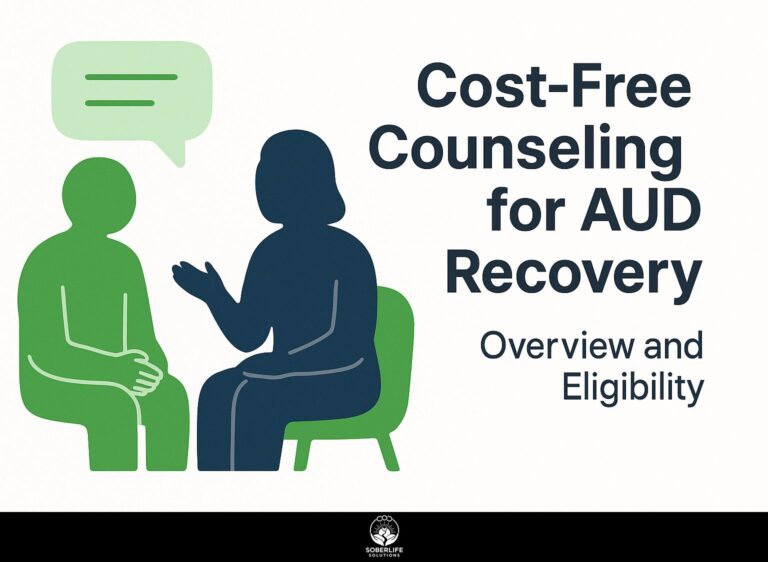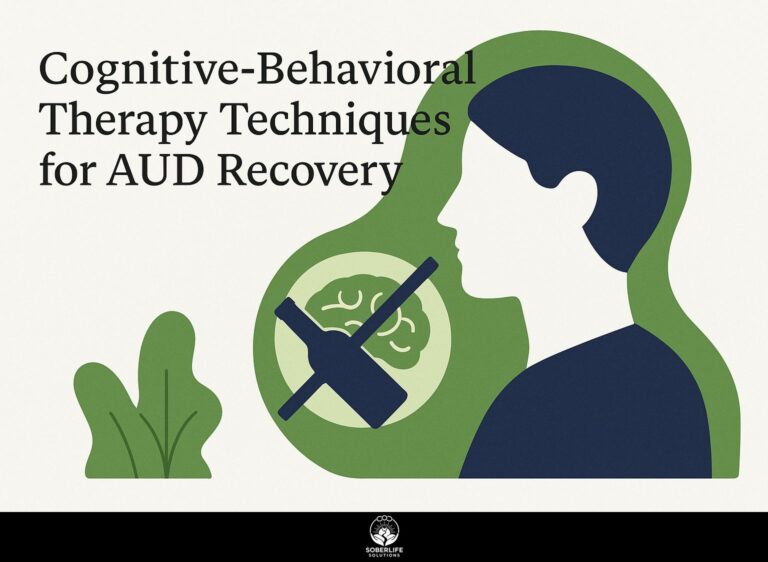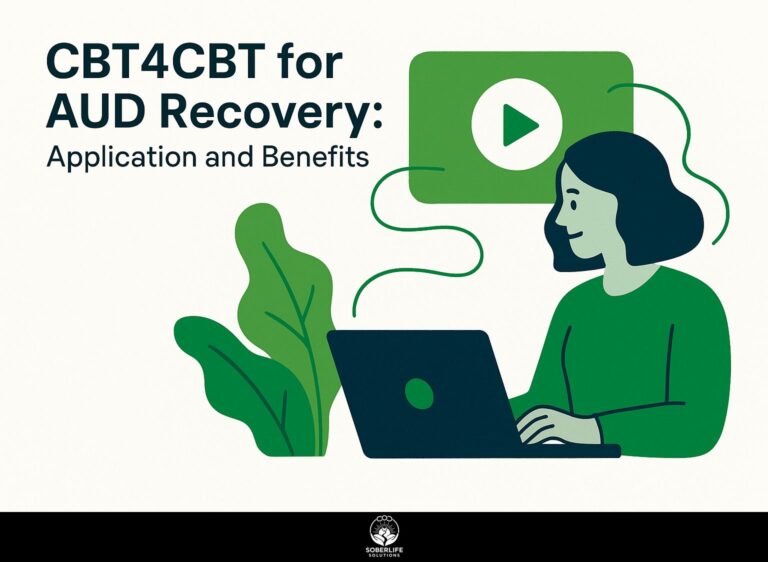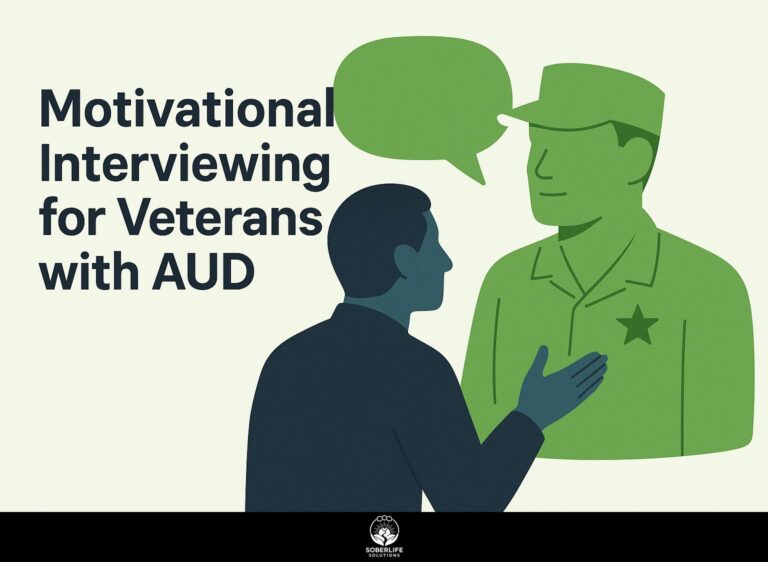Teletherapy for AUD: Benefits, Access, and Recovery

Introduction to Teletherapy for AUD
Telehealth and telemedicine provide new methods for treating addiction, especially for people dealing with Alcohol Use Disorder (AUD). People can attend important meetings and get help for substance use problems from home using video calls. This article discusses the advantages of teletherapy, points out how easy it is to access, and emphasizes its importance in recovery, providing a key tool for those looking for good treatment options.
Key Takeaways:
Alcohol Use Disorder (AUD) Explained
Alcohol Use Disorder (AUD) affects millions, with recent studies showing that approximately 14.5 million adults in the U.S. suffer from this condition.
Alcohol Use Disorder often appears with long-term health issues like depression, anxiety, and heart diseases. Studies show that people with AUD are much more likely to develop these problems, pointing to the urgent need for complete treatment plans.
Effective interventions include:
- Cognitive-behavioral therapy (CBT) that addresses both alcohol dependence and mental health
- Motivated group therapies
- Pharmacological options like naltrexone
Knowing the effects of alcohol use disorder on health over time is important for improving health outcomes and encouraging people to find appropriate treatment. As expert opinion published by the JAMA Psychiatry notes, understanding the prevalence and risks associated with AUD can help tailor these treatment strategies effectively. For those seeking to enhance their well-being during recovery, consider exploring how to improve quality of life during alcoholism recovery.
What is Teletherapy?
Teletherapy, part of telehealth, uses video calls like Zoom or Doxy.me to provide counseling for mental health and substance use issues.
In practice, teletherapy enables patients to engage in therapy from the comfort of their homes, promoting higher accessibility and convenience.
Therapists can hold sessions through secure platforms that keep information private. The growing adoption in addiction treatment is evident through mobile applications like BetterHelp and Talkspace, which allow for real-time communication and support.
These platforms provide video sessions and messaging features to give clients ongoing care, helping maintain a regular treatment plan.
Benefits of Teletherapy for AUD
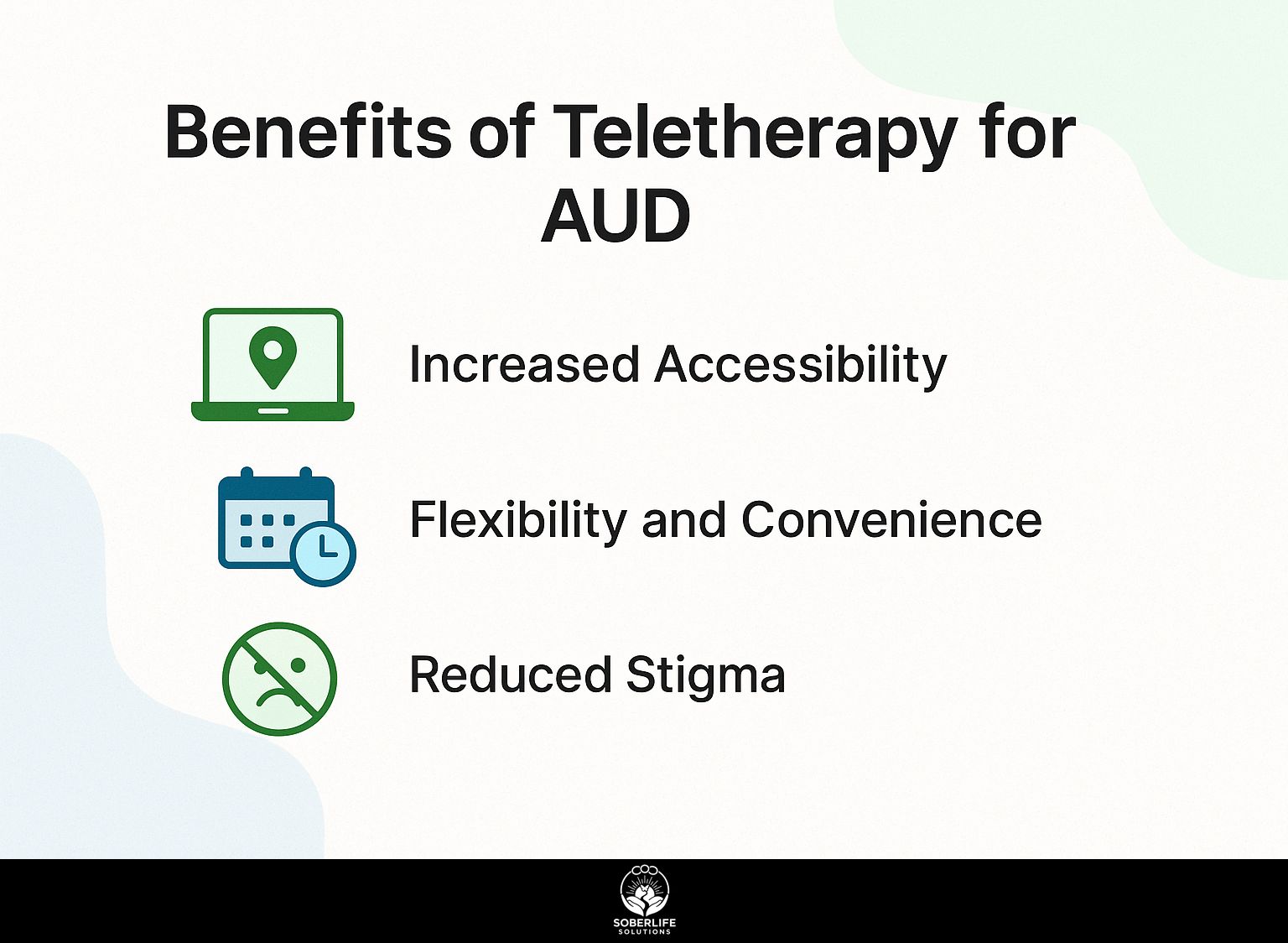
Teletherapy provides important benefits for people dealing with Alcohol Use Disorder, such as easier access, more scheduling options, and less judgment from others.
Increased Accessibility
Teletherapy greatly improves access to addiction treatment, especially in rural regions where healthcare choices might be scarce.
Technology allows patients to communicate with licensed professionals through platforms such as BetterHelp or Talkspace, which provide secure video communication.
Statistics reveal that telehealth adoption surged by over 60% during the pandemic, especially in underserved regions where traditional treatment locations are scarce, as highlighted in a CDC report about the trend.
For instance, a rural patient in Montana can receive counseling from a specialist based in a metropolitan area, reducing travel time and costs. This change makes it easier to get involved right away and keeps people participating in treatment programs over time. Worth exploring: Legal updates on addiction treatment that may impact how services are provided remotely.
Flexibility and Convenience
Patients benefit from the flexibility of teletherapy, which allows sessions to be scheduled around their personal commitments, enhancing treatment engagement.
With apps like BetterHelp and Talkspace, patients can easily choose appointment times that fit their lives.
BetterHelp offers a messaging feature, enabling patients to communicate with their therapists between sessions, which can be particularly helpful during a busy week. Talkspace, on the other hand, provides video and audio messaging options for flexible engagement.
Both platforms make sure you can receive care at home, cutting down on travel and scheduling problems. The availability of this service makes it easier to access and encourages regular visits and continuous communication with therapists.
Reduced Stigma
Teletherapy allows individuals to receive support for AUD without the concern of judgment, as they can participate from their own homes.
This comfort encourages openness, as many users report feeling less judged and more willing to share their experiences.
For instance, one user stated, “In my own space, I felt freer to discuss my struggles without the anxiety of being in a clinic.”
Virtual platforms frequently offer features such as text chat and screen sharing, which help express emotions and choices more clearly.
These tools create a welcoming space, greatly helping people recovering from alcohol addiction.
Accessing Teletherapy Services
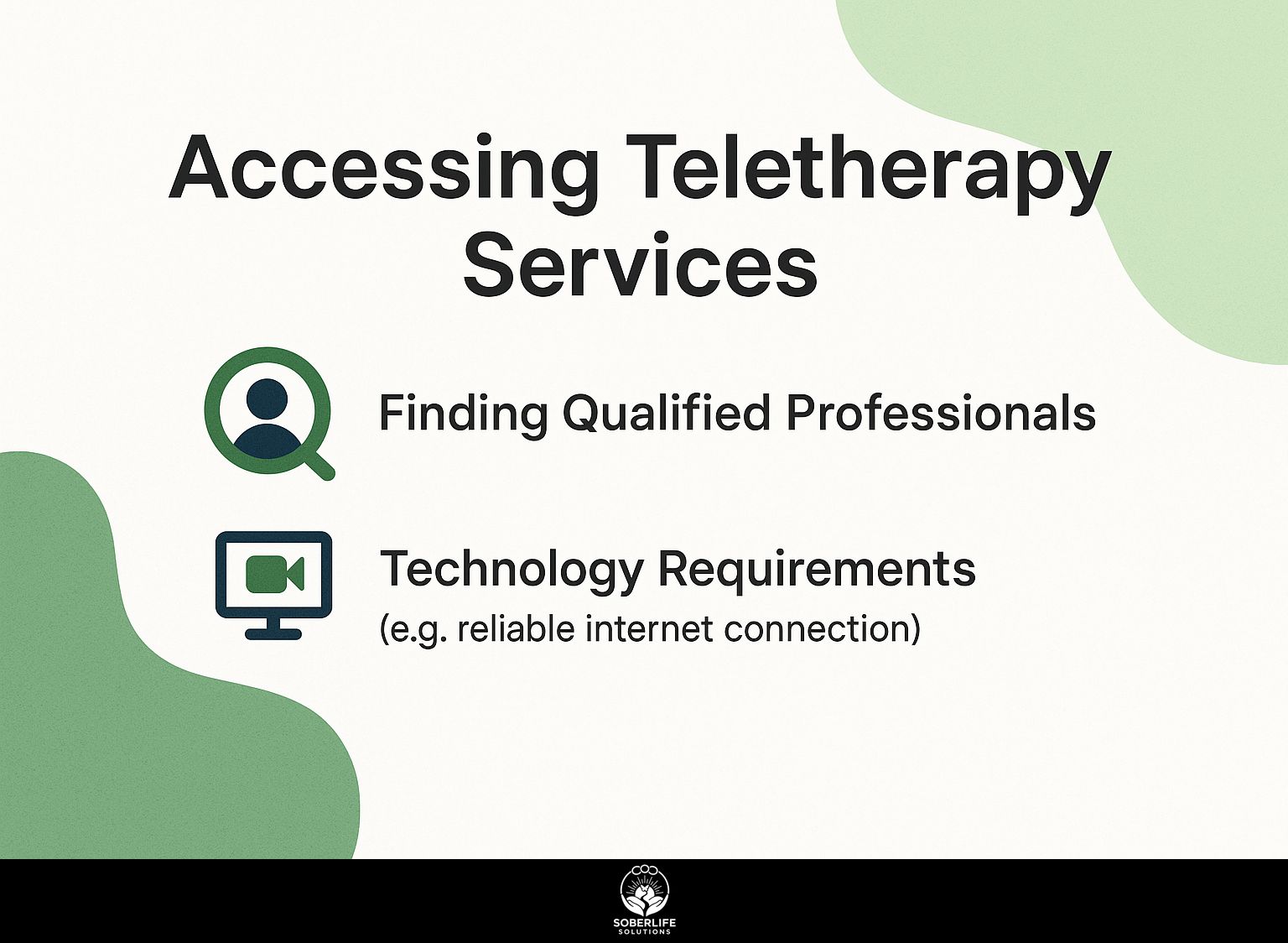
To receive teletherapy services, follow certain steps to connect with qualified therapists who can provide appropriate care.
Finding Qualified Professionals
Find licensed experts who specialize in Alcohol Use Disorder using online platforms like Psychology Today or BetterHelp to begin your teletherapy experience.
You can improve your search by using platforms like TherapyDen, which prioritizes inclusive care, or SAMHSA’s National Helpline for more support resources.
After identifying possible providers, confirm their qualifications by reviewing state licensing boards to make sure they meet the required standards. Reading client reviews is helpful because they can show you the skills and methods used. Contacting providers directly to inquire about their experience with Alcohol Use Disorder can further help you gauge their suitability.
Technology Requirements
To successfully engage in teletherapy, patients need basic technology tools, including reliable internet access and a compatible device for video conferencing.
A stable internet connection with at least 3 Mbps speed for uploading and downloading is needed to prevent interruptions.
Platforms such as Zoom are easy to use and safe. Other options like Microsoft Teams or Google Meet are also effective.
Make sure to test audio and video settings beforehand, and consider using headphones to reduce background noise.
If technical issues arise, restarting the device or checking for software updates often resolves connection problems.
Challenges in Teletherapy for AUD
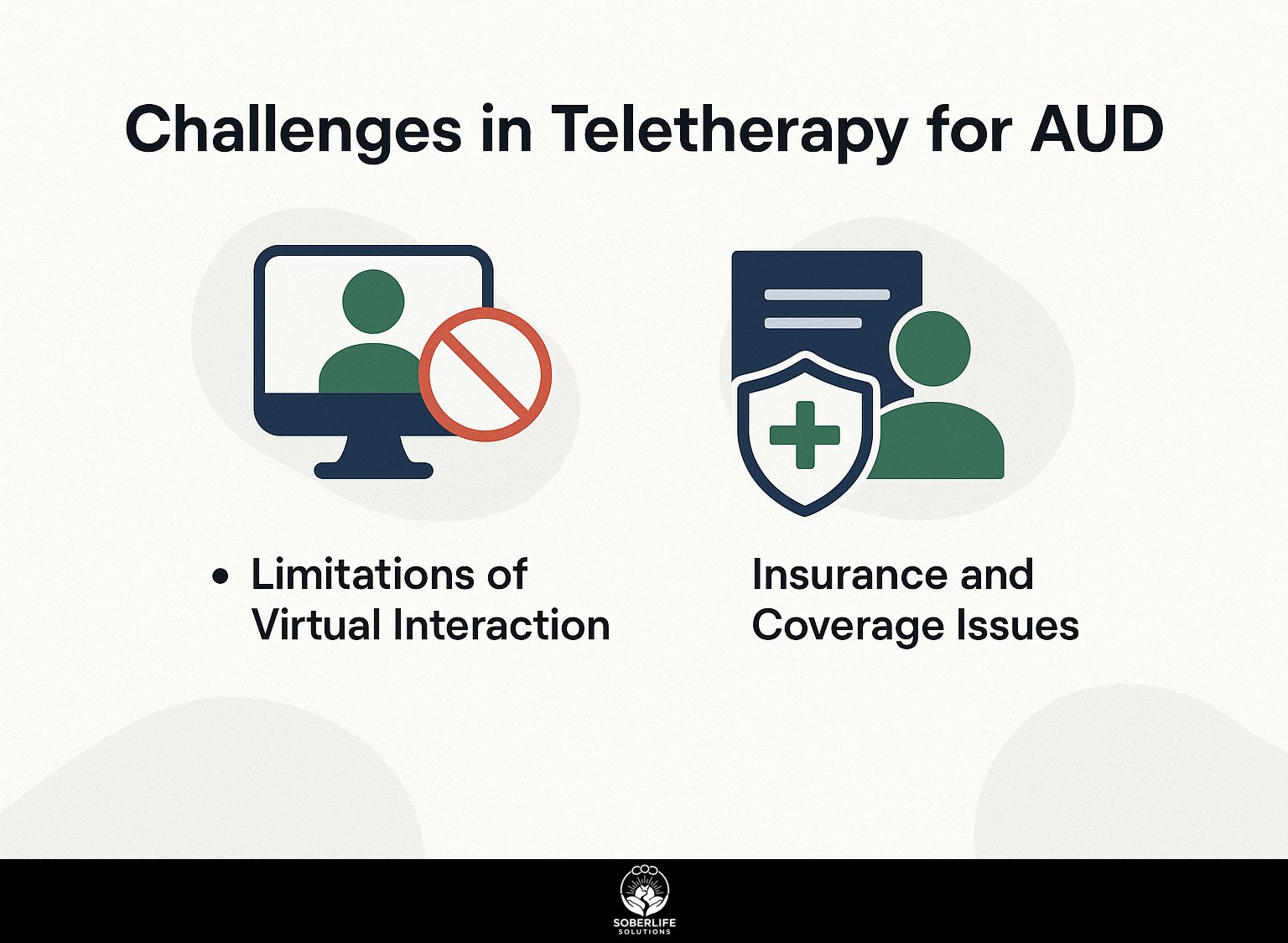
Teletherapy offers many benefits, but it also confronts specific obstacles that can affect how well it treats Alcohol Use Disorder.
Limitations of Virtual Interaction
Virtual interactions can limit the therapist’s ability to observe non-verbal cues, potentially impeding effective communication during sessions.
To increase participation, therapists can use various methods. Use high-quality webcams to make videos clearer, which can help you see small facial expressions.
Suggest that clients show their screens while talking. This helps teamwork and lets therapists see how clients respond immediately. Regularly asking clients how they feel about using virtual tools can encourage honesty and help make sure that technology does not get in the way of therapy.
These approaches can strengthen the therapeutic connection even when not in the same location.
Insurance and Coverage Issues
Figuring out if your insurance covers online therapy can be confusing, and many people are unsure if their insurance will pay for virtual sessions for AUD treatment.
Each state has unique regulations affecting teletherapy coverage. For example, California mandates that insurance plans cover medically necessary telehealth services, while Florida requires this only for specific conditions. The American Medical Association’s State telehealth policy trends: 2023 year in review offers a respected source for understanding these varied state regulations.
Insurance companies such as UnitedHealthcare and Anthem Blue Cross provide teletherapy coverage, but you should check your specific plan. Patients can directly contact their provider or check online portals to confirm coverage details.
Using resources like the National Council for Behavioral Health can help patients understand their rights and locate insurers aligned with their treatment needs.
Effectiveness of Teletherapy
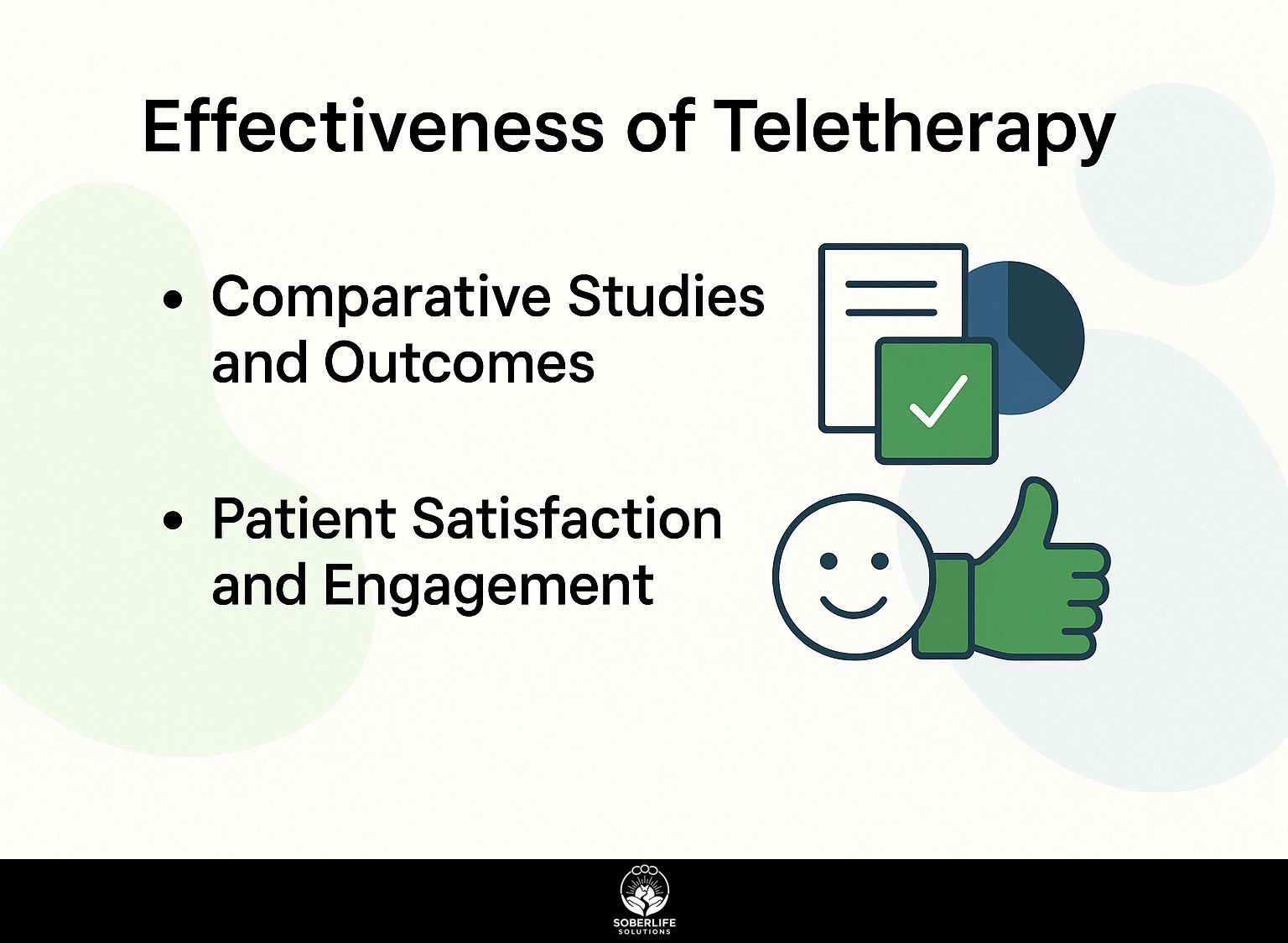
Studies show that teletherapy works as well as face-to-face therapy in treating Alcohol Use Disorder, with patients experiencing similar results.
Comparative Studies and Outcomes
A review of 30 studies found that patients using teletherapy for alcohol use disorder had recovery results similar to those who received face-to-face treatment.
The review highlighted that dropout rates for teletherapy were notably lower, averaging around 15% compared to 25% for face-to-face sessions. Treatment retention was also favorable, with teletherapy showing a 70% completion rate versus 65% for traditional counseling.
These measurements show that teletherapy is as effective as face-to-face counseling and may lead to better patient commitment. As mental health facilities start using more teletherapy options, knowing this information is important for improving how patient care strategies are made.
Patient Satisfaction and Engagement
Patient satisfaction rates for teletherapy programs often exceed 85%, with many individuals reporting higher engagement levels due to the convenience of access.
Factors contributing to these high satisfaction levels include flexible scheduling, reduced travel time, and the comfort of receiving care from home.
Programs often use surveys and feedback forms after sessions to assess how involved patients are. For instance, a recent survey indicated that 90% of participants felt more comfortable discussing sensitive issues remotely.
Testimonials highlight improvements in mood and coping strategies, illustrating the positive impact of this modality on mental health.
Programs that regularly change according to patient responses usually get better participation rates.
Frequently Asked Questions
What is teletherapy and how can it benefit those with AUD?
Teletherapy for AUD (alcohol use disorder) is a type of therapy done remotely using video calls or phone conversations. This method allows individuals to receive treatment for AUD from the comfort of their own home. It provides easy access, comfort, and confidentiality for individuals looking for support with their alcohol habits.
What are the main benefits of teletherapy for AUD?
Some main advantages of teletherapy for AUD include easier access to care, reduced stigma and obstacles to seeking help, and the chance to get advice from experienced professionals. It also allows individuals to attend therapy sessions without having to leave their home or take time off work.
Is teletherapy for AUD as effective as in-person therapy?
Studies have shown that teletherapy for AUD can be just as effective as in-person therapy. It allows for the same level of support, guidance, and treatment options, while also providing the convenience and accessibility of remote sessions. However, the results may differ for each person depending on their unique requirements.
What are the barriers to accessing in-person therapy for AUD?
There are many barriers that can prevent individuals from accessing in-person therapy for AUD, such as distance, transportation, work schedules, and stigma. These obstacles can make it hard for people to get the help and care they require. Teletherapy can help to overcome these barriers and provide easier access to treatment.
Can teletherapy for AUD aid in the recovery process?
Teletherapy can be an effective method for helping people recover from AUD. It offers ongoing support, coping strategies, and a safe space for individuals to share their struggles and progress. It can also help people find support groups and other resources to aid in their recovery process.
Is teletherapy for AUD covered by insurance?
In many cases, teletherapy for AUD is covered by insurance. It is important to check with your insurance provider to confirm coverage and discuss any potential out-of-pocket costs. Some therapists may also offer sliding scale fees or payment plans to make teletherapy more affordable.

